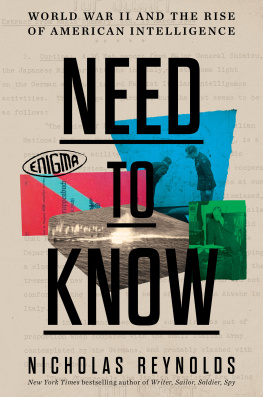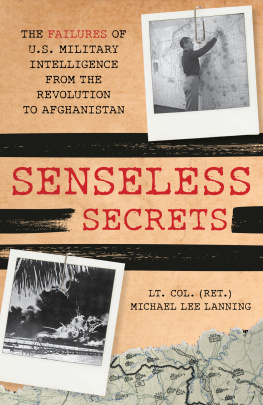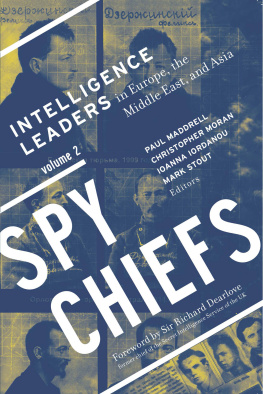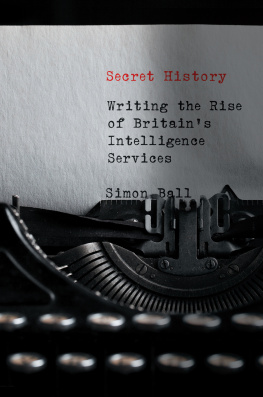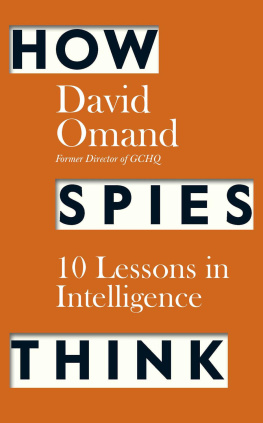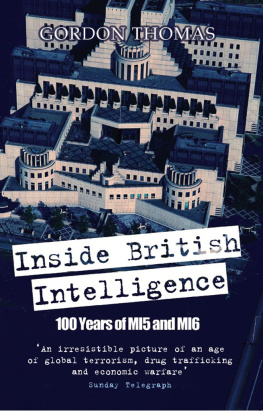This book is for Rebecca Reynolds
Real intelligence work... will never cease. Its absolutely essential that we have it.... It brings to a strong government what it needs to know.
John le Carr, 1997
Contents
Vincent AstorScion of a wealthy family and FDR intimate who ran the Room, a private intelligence agency based in New York City
Adolf A. Berle Jr.Assistant secretary of state who served as the point man at the Department of State for intelligence matters during World War II; New Dealer with strong ties to FDR
David K. E. BruceOne of the founders of the Secret Intelligence Branch of OSS, then chief of the OSS base in London in 1943 and 1944, a senior diplomat after 1945
John Franklin CarterSometime diplomat, journalist, spy novelist, and FDR confidant who ran a private spy bureau for the president during World War II
William J. CaseyNew York lawyer who joined OSS and learned how to run operations against the German homeland in 194445; future director of CIA
Carter W. ClarkeCareer army officer who supported the work of Alfred T. McCormack in signals intelligence
A. G. DennistonThe first wartime head of the Government Code and Cypher School at Bletchley Park, Britains codebreaking establishment
William J. DonovanWorld War I hero, Wall Street lawyer, and Republican internationalist who founded COI and then OSS in World War II
Allen W. DullesNew York lawyer and former diplomat who ran the OSS base in Bern, Switzerland, during World War II; future director of CIA
William A. EddyArabist and educator who served in the Marine Corps in World War I and directed intelligence operations for OSS in North Africa in World War II
Carl F. EiflerUS Army reservist who created OSS Detachment 101 in the China-Burma-India Theater, pioneer of OSS special operations
James Russell ForganChief of the OSS in Europe following David K. E. Bruce
William F. FriedmanThe grand old man of army cryptology who laid the groundwork for its success in World War II
Hans Bernd GiseviusGerman lawyer and Abwehr officer stationed in Switzerland who, as part of the German Resistance to Hitler, met frequently with Allen Dulles
John H. GodfreyRoyal Navy admiral and director of Naval intelligence early in World War II; with his aide Ian Fleming, instrumental in promoting Donovans fortunes
Colin M. GubbinsBritish Army officer who guided the growth and operations of the Special Operations Executive in London, the rough equivalent of OSS Special Operations Branch
Thomas HolcombCommandant of the US Marine Corps during World War II, overseeing its growth from a small landing force to a fourth armed service
J. Edgar HooverLongtime FBI director, mainstay of many a Washington intrigue, who directed counterespionage operations at home and in Latin America during World War II
Cordell HullAmerican secretary of state for most of World War II
Joseph P. KennedyAmerican ambassador to London, remembered for his defeatism and for being the father of future president John F. Kennedy
Ernest J. KingStrong-willed US Navy admiral who served as both chief of Naval operations and commander in chief of the fleet during World War II
Kenneth A. KnowlesUS Navy officer who, with British help, stood up a successful operations center in Washington to combat U-boats in the Atlantic
Frank KnoxNewspaper publisher, Republican politician, and supporter of William J. Donovan while secretary of the navy in World War II
Fritz KolbeOne of the great spies of World War II, this midlevel bureaucrat in the German Foreign Ministry passed original documents to Allen Dulles in Switzerland
Edwin T. LaytonUS Navy officer who served as the fleet intelligence officer at Pearl Harbor for most of World War II
William J. LeahyUS Navy admiral who, during World War II, served as ambassador to Vichy France and then as chief of staff to Presidents Roosevelt and Truman, making him the most senior and influential officer in the US military
Duncan C. LeeRhodes scholar, Wall Street lawyer, and Soviet spy who served as an aide to Donovan at OSS; despite overwhelming evidence against him, he never confessed to betraying his country
John MagruderUS Army officer who was one of Donovans deputies at OSS and head of the successor organization, the Armys Strategic Services Unit
George C. MarshallChief of staff of the US Army during World War II, a pivotal figure in strategic decision-making and a patron of signals intelligence
Joseph O. MauborgneMultitalented US Army officer who was a pioneer of cryptology during World War I; future chief signal officer of the army; supportive of Friedman and his work
Alfred T. McCormackNew York lawyer who shaped the system for processing and delivering army signals intelligence in World War II
Stewart MenziesDuring World War II, head of Britains MI6, the agency responsible both for human intelligence and signals intelligence
Chester W. NimitzUS Navy admiral in command of the Pacific Fleet for most of World War II
John and Joseph RedmanBrothers who were senior officers in the Office of Naval Communications, remembered for centralizing signals intelligence as well as downplaying the role of Joseph Rochefort
Joseph J. RochefortUS Navy officer responsible for radio intelligence at Pearl Harbor in 1941 and 1942, remembered for predicting Japanese movements during the Battle of Midway
James G. RogersDistinguished lawyer, educator, and mountain climber who served as a strategic planner for OSS
Frank RowlettCryptologist who was one of Friedmans early hires in army signals intelligence; remembered for his groundbreaking work on Japans Purple code
Laurance SaffordUS Navy officer who, in the 1920s and 1930s, laid the foundations for navy cryptology; the rough equivalent of the armys William F. Friedman
William StephensonBritish spy impresario based in New York during World War II, responsible for operations to increase American support for Britain, which included promoting Donovan as US intelligence chief
Henry L. StimsonProminent lawyer and Republican statesman who served both as secretary of state and twice as secretary of war, progressed from believing that gentlemen do not read each others mail to supporting signals intelligence in World War II
George V. StrongUS Army general who promoted signals intelligence and collaboration with Britain but clashed with Donovan and OSS
Telford TaylorBrilliant legal scholar who served in army intelligence under Carter W. Clarke and liaised with Bletchley Park; joined and eventually headed the prosecution at the trials of German war criminals after the war
Joseph N. WengerUS Navy officer and cryptologist responsible for strategic planning for the navys Op-20-G
Rodger WinnBrilliant British lawyer and wartime Royal Navy officer who created a very successful operations center in London for the war at sea against U-boats
Sir William WisemanBritish spy impresario based in New York in World War I who set precedents for William Stephenson by winning President Wilsons confidence
Karl WolffSS general who met with Allen Dulles and arranged the Secret Surrender in Italy in 1945
Herbert O. YardleyOne of the pioneers of American codemaking and codebreaking in World War I, head of the Black Chamber in New York during the 1920s, the US governments off-the-books codebreaking enterprise
W orld War II has always been in my blood. It was the defining event of my parents lives, and from early childhood I started to absorb their stories of the great cataclysm. My father was in London after D-day, enduring the V-1 buzz bombs and the V-2 doodlebugs, German missiles that would strike the city hard and at random, each with almost a ton of high explosives. A junior member of the American Foreign Service, he was preparing to deploy to Germany on a joint US State DepartmentBritish Foreign Office team to capture the Third Reichs Foreign Office documents before they were destroyed. My mother was one thousand miles away in Hungary, enduring the siege of Budapest and the Soviet occupation that followed. What they wanted for their children after the war was a more peaceful existence, one without incoming German bombs or trigger-happy Red Army soldiers standing on every street corner. But what I wanted from childhood on was to understand what it was like to be in the thick of world events.
Next page
